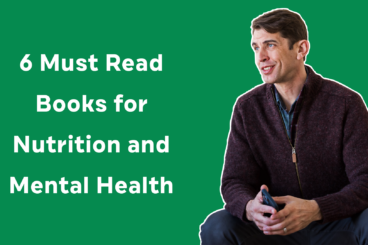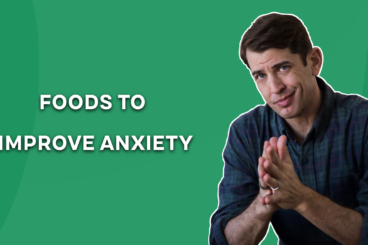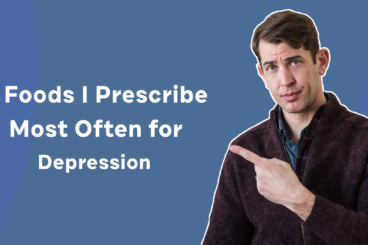I’m interested in how food can impact the mental health of my patients and my own mental health. I lecture a lot about this and go over some of the big mechanisms. There’s a lot of great research but it often comes down to one question I get asked, how does food actually impact mental health? So I mapped out the nine different mechanisms by which the research suggests food is playing a role in influencing how our brain works and therefore influencing mental health conditions like depression and anxiety.
Nutritional deficiency and insufficiency
The first mechanism is nutrient deficiency or insufficiency. This is when an individual isn’t getting enough of a nutrient or isn’t absorbing it, such as vitamin B12. If an individual isn’t getting enough vitamin B12, they’re going to have low energy, anxiety, depression, and eventually dementia, because not having enough B12 is absolutely horrible for your brain. We also want to think about the population data, for example, when a population eats less zinc there’s an increased risk of depression. So one of the ways nutritional psychiatry works is by helping people who have a poor nutritional status. Let’s say they’re eating a lot of processed food, lots of sugar, and alcohol. There is definitely going to be a nutrient insufficiency there. We then will find a way to get them onto a really, what we call nutrient dense diet, which is a food plan that gets all of the nutrients that an individual needs and that the brain needs from whole foods.
Neuroplasticity
Number two is a very exciting mechanism called neuroplasticity and the influence of food on BDNF, brain derived neurotrophic factor. When I finished medical school in the year 2000, they called us doctors of the future. We didn’t even know about neuroplasticity. We didn’t know the adult human brain continued to grow. This is really exciting, especially if you’re in your late forties, early fifties like me, where the idea that I can grow more brain cells is very hopeful for me. If we’re struggling with mental health symptoms, a lot of patients have the idea that this is permanent and that they will have their condition forever. Neuroplasticity gives us this notion of hopefulness now. We can get our brains growing and functioning in a better way in recovery.
Inflammation
Inflammation is a huge buzzword in medicine for good reasons. Inflammation is our body’s alarm system and we want an alarm system that protects us from all of the various invaders trying to to make us sick. The argument these days is that the way we’re living our life, with not a lot of sleep, poor quality of food, lots of media, and a lot of stress, leads to more inflammation than our bodies are used to. Over time inflammation is really bad for our brain. You want the alarm systems going off when they should, of course, but you don’t always want excess levels of inflammation. This is damaging. It inhibits neuroplasticity. We estimate that one third to one half of patients who struggle with resistant depression are struggling with chronic inflammation. There’s also data showing that if you add an anti-inflammatory onto antidepressant treatments, you can up to double the efficacy of how well that antidepressant works. So there is really interesting research on inflammation and mental health concerns. The bottom line is there is a lot that individuals are doing in their everyday eating that trigger a lot of inflammation. This could be a lot of excess sugars and also these new molecules that we’ve put in food such as trans fats, food dyes, preservatives. We don’t know what some of these do to the body and others we know clearly cause inflammation. A simple way to avoid that stuff is getting back to eating whole foods.
Microbiome
The fourth mechanism is the microbiome. You can’t say brain health these days without talking about the microbiome. We’ve always known about this gut-brain connection. A lot of individuals talk about the gut as the second brain and people who have an evolutionary stance think about the gut as the first brain. There are lots of nerves and neurons in your gut and the gut is a central part of the immune system and of your inflammatory response. The microbiome is all of the bacteria that live mostly in your colon. They digest our food, they feed the lining of our colon, they make some vitamins that we can’t make. They make vitamin K2 and even make little vitamin C and B12, for example. So they do a lot for us and they send lots of signals to the brain via the vagus nerve. Having a diverse microbiome, which means eating fermented foods and a lot of plants, is what over time seems to correlate with better health and better mental health.
Plants and phytonutrients
Number five is plants and phytonutrients. From a microbiome perspective, you can eat lots of fermented foods, but you’ve got to also feed those “good bugs”. The “good bugs” are organisms that promote health in our gut and you need to feed them fiber. Getting more plants in your diet is really critical for a lot of individuals, especially folks struggling with their mental health. Not only do you get fiber from plants but also vitamins, minerals, and phytonutrients. Phytonutrients really only exist in plants. These are things like lycopene, sulforaphane, quercetin, hesperidin. These are molecules that have biological activity. A lot of times people think they’re just antioxidants. They’re really a lot more than that. They’re signaling molecules. So some of them, for example, can cause our liver to kind of ramp up its detoxification enzymes. Others will go from the end of our fork all the way up to our brain and protect some of our brain cells. So plants and phytonutrients make up one of the mechanisms that nutritional psychiatry really can help you with in terms of your mental health.
Toxic effects of highly processed foods
Number six is toxic effects of highly processed foods, ultra processed foods, or as we call it, the modern western diet. This is a diet that has lots of refined carbohydrates and a lot of the wrong fat such as vegetable oil, soybean oil, and corn oil. It consists of a lot of fried foods. Highly processed foods contain partially hydrogenated fats. Partially hydrogenated soybean oil, for example, has lots of trans fats in there. Food dyes are correlated with what researchers estimate about 9% of the global burden of ADHD. Also, there is an increased medication load since individuals are eating the wrong foods, struggling with more obesity, struggling with more diabetes, individuals take more medications and there are always some effects of that.
Food-cebo effect
Number seven is what I call the food-cebo effect. Now, the placebo effect in some ways has a bad rap. I’m a psychiatrist. I think things that help us feel better over and over again are what is good for our mental health. The food-cebo effect is the idea that when we have a set of values or even a set of rules around food when we are within a food community. So if you’re a vegetarian, you’re connecting with lots of your veggie friends and you’re having vegetarian potlucks. There’s a food-cebo effect. You’re eating in a way that according to your values, really promotes health. This is why vegans come and see me and they tell me they’ve got great energy and their mental health is much better. Carnivores that see me have the same report. In part, that’s because these diets cut out a lot of processed food but I also think there’s a food-cebo effect. We believe we’re doing something good for ourselves and I certainly hope that’s a bit of how nutritional psychiatry can work for you. That’s the empowering part.
Food connection and community
Number eight is food connection and community. We know isolation is horrible for our mental health. We know isolation can even increase inflammation. So food is one of those fundamental primal ways we connect. We gather around the dinner table to feast. Think about how many of your great memories are made talking with folks over a great meal or having people over to your house for something to eat. So food connection and food community is another way that food can help our mental health by connecting us.
Empowerment and self-care
Number nine is empowerment and self-care. A lot of things in mental health feel elusive or confusing. Psychotherapy, one of the real fundamental treatments in mental health can take a long time. It’s pretty painful at times. Medications have a lot of stigma and bias that often come with some side effects. Medication can be very helpful but not very empowering. Nutritional psychiatry is empowering because it tells us that every day there are little things that we can do, little battles in some ways that we can fight and we can win. We can make choices to choose delicious, nutritious foods that feed our mental health and I think that’s empowering. Now, certainly when someone’s in the midst of a mental health crisis, with horrible depression and horrible anxiety, this information, if it’s not presented well, can feel overwhelming. It might feel like there are so many things you have to do and so many nutrients I have to take in. That’s why we try and keep it really straightforward and simple.
Nutritional psychiatry is about picking foods that you enjoy, getting whole foods into your diet, eating a lot more plants, more seafood, more fermented foods than most people are eating. Focus on some of those fundamental food categories. Maybe you’ve heard my little rhyme, “seafood, greens, nuts and beans, and a little dark chocolate”. I hope these nine mechanisms help you think about all of the various ways that nutritional psychiatry can work and help you with your mental health. There’s so much exciting new science about food and mental health, and I hope you’ll stay tuned as we learn more about it together.



